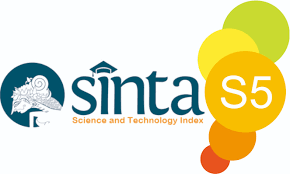Hubungan Persepsi Risiko dan Ekspektasi Return terhadap Minat Berinvestasi Mahasiswa di Pasar Modal
Abstract
ABSTRAK
Di era saat ini investasi mulai banyak diminati dikalangan masyarakat terutama mahasiswa. Hal ini
dapat dilihat dengan meningkatnya jumlah investor di rentang usi 18 hingga 30 tahun, yang dimana pada usia
tersebut merupakan seorang mahasiswa. Oleh karena itu Bursa Efek Indonesia menargetkan mahasiswa
untuk meningkatkan investor muda di pasar modal. Penelitian ini bertujuan untuk mengetahui bagaimana
hubungan yang dimiliki oleh persepsi risiko dan ekpektasi return terhadap minat berinvestasi mahasiswa
Universitas Kristen Indonesia angkatan 2019 dan 2020 di pasar modal. Metodologi penelitian menggunakan
pendekatan kuantitatif. Populasi pada penelitian ini adalah mahasiswa Universitas Kristen Indonesia angkatan
2019 dan 2020 dengan jumlah sampel sebanyak 100 responden. Penelitian ini menggunakan data primer
dengan teknik pengambilan sampel menggunakan simple random sampling dengan 100 responden. Data
dikumpulkan melalui kuisioner dengan memanfaatkan google form yang selanjutnya data diolah dengan
SPSS. Hasil penelitian dengan pengujian hipotesis korelasi pearson menunjukkan ekpektasi return
berhubungan secara positif dengan minat berinvestasi mahasiswa Universitas Kristen Indonesia angkatan
2019 dan 2020 di pasar modal, sedangkan persepsi risiko tidak berhubungan dengan minat berinvestasi
mahasiswa Universitas Kristen Indonesia angkatan 2019 dan 2020 di pasar modal.
Kata kunci : Persepsi Risiko, Ekspektasi Return, Minat Berinvestasi, Pasar Modal
ABSTRACT
In the present era, investment is becoming increasingly popular among the general public,
especially among students. This can be observed through the growing number of investors in the
age range of 18 to 30 years, which includes university students. Therefore, the Indonesia Stock
Exchange aims to target students to increase young investors in the capital market. This research
aims to determine the relationship between risk perception and return expectations on the
investment interest of 2019 and 2020 cohorts of students at the Universitas Kristen Indonesia
(Christian University of Indonesia) in the capital market. The research methodology used a
quantitative approach. The population in this study consists of students from the 2019 and 2020
cohorts at the Universitas Kristen Indonesia, with a sample size of 100 respondents. This study
used primary data collected through a questionnaire using simple random sampling with 100
respondents. Data was collected via a questionnaire distributed through Google Forms, and
subsequently, the data was analyzed using SPSS. The research results, using Pearson correlation
hypothesis testing, indicate that return expectations are positively correlated with the investment
interest of 2019 and 2020 cohorts of students at the Universitas Kristen Indonesia in the capital
market. On the other hand, risk perception is not positively correlated with the investment interest
of these students.
Keyword: Risk Perception, Return Expectations, Investment Interest, Capital Stock




